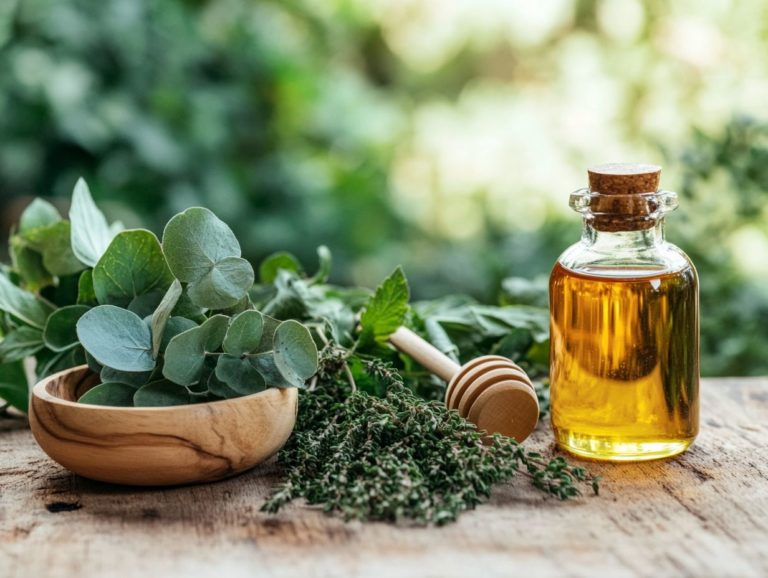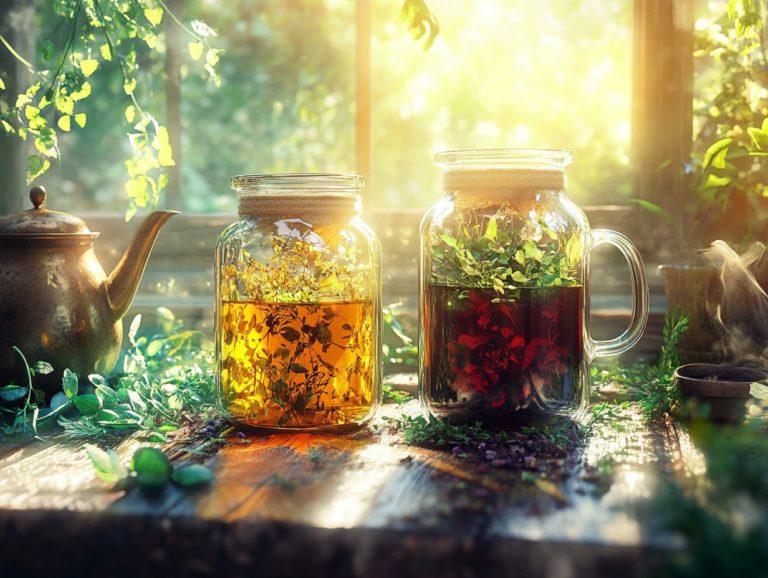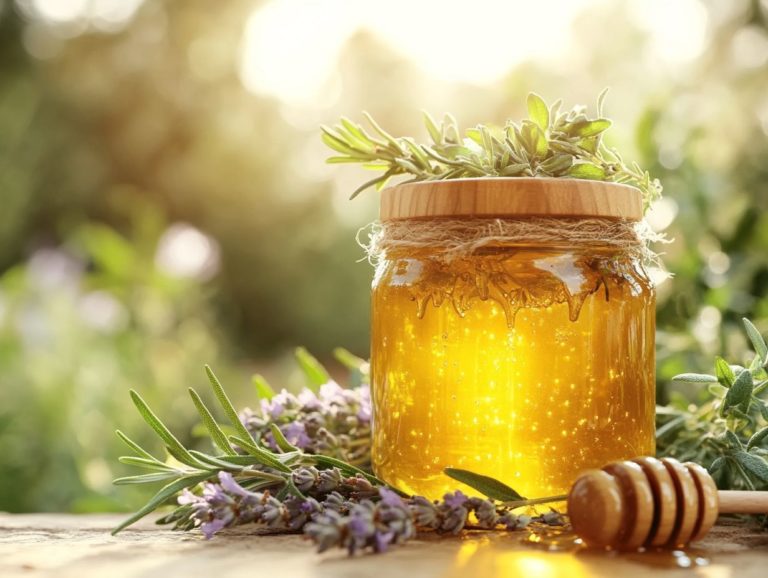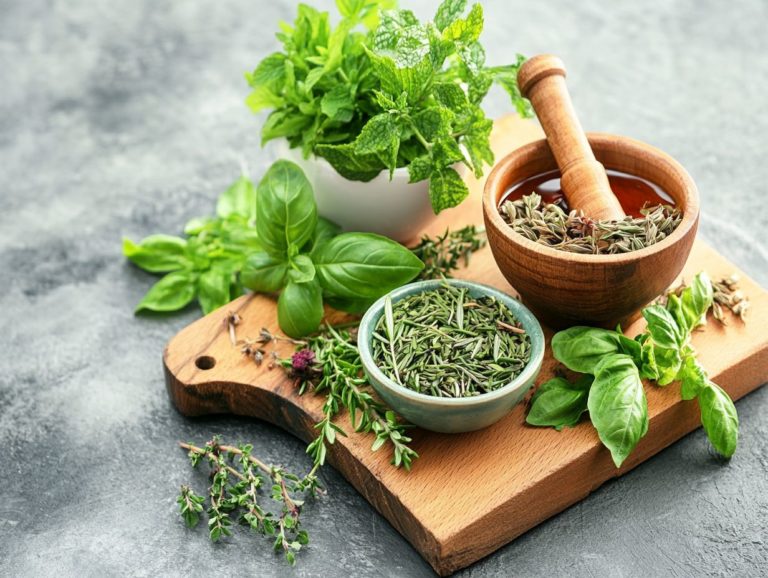5 Best Herbs for Mood Boosting
Feeling down or overwhelmed is something many can relate to, but nature provides a treasure trove of herbs that might just help lift your spirits and calm your mind.
This article delves into five of the finest herbs traditionally celebrated for their mood-enhancing properties: St. John’s Wort, Lavender, Ashwagandha, Rhodiola Rosea, and Passionflower. Each of these herbs offers unique benefits, potential side effects, and practical ways for you to weave them into your daily routine.
Explore how these natural remedies can bolster your emotional well-being!
Contents
Key Takeaways:
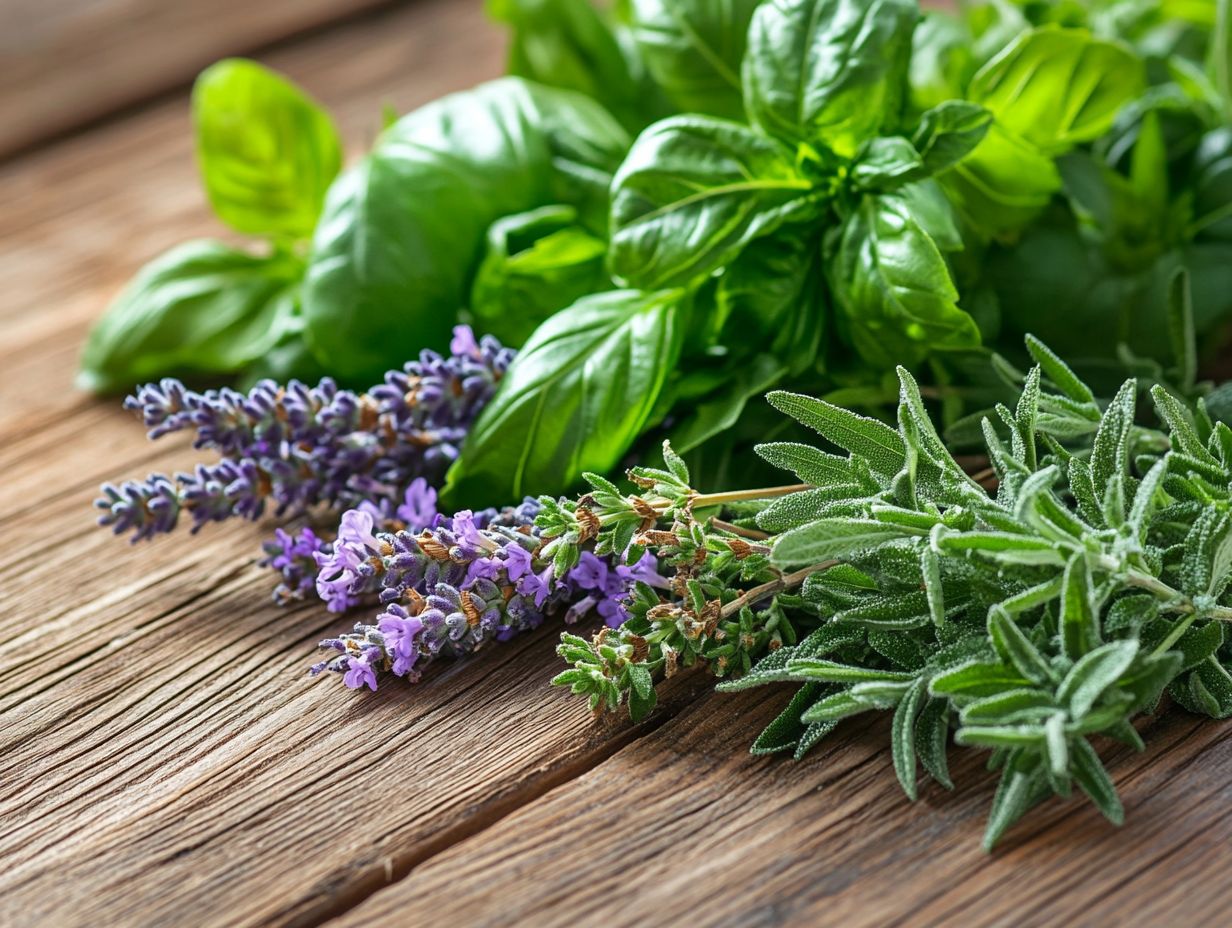
- St. John’s Wort can help improve mood by increasing serotonin levels in the brain.
- Lavender has calming effects and can reduce anxiety and stress, leading to an improved mood.
- Ashwagandha is a natural substance that helps your body manage stress and promotes feelings of calmness and well-being.
1. St. John’s Wort
St. John’s Wort is a celebrated herb for mood support, known for its potential to relieve anxiety and reduce stress. If you’re seeking a natural remedy to enhance your happiness and overall mental well-being, this remarkable herb could be just what you need. It s particularly recognized for promoting emotional resilience, enabling you to navigate life’s stresses with a sense of calm.
Studies, including research from Oxford University, underscore the importance of herbal interventions in supporting brain health and stabilizing mood. Historically, St. John’s Wort has roots dating back to ancient civilizations, especially among the Greeks and Romans, who believed it had protective qualities against evil spirits and misfortune.
Today, this herb is valued for its active compounds, such as hypericin and hyperforin, which interact with neurotransmitters in your brain. This can greatly help people with mild to moderate mood issues and anxiety.
Scientific studies show that St. John’s Wort may be as effective as standard antidepressants, often with fewer side effects. You can consume this herbal remedy in various forms teas, capsules, or liquid extracts. Just remember to consult a healthcare professional for appropriate dosages to ensure you reap the optimal benefits.
2. Lavender
Lavender is widely celebrated for its remarkable calming properties, making it an invaluable herb for stress relief and achieving a serene state of mind. This beloved herb not only adds vibrant purple hues to your garden but also serves as a cornerstone in the world of aromatherapy, where its soothing scent creates tranquil environments.
Many individuals like you turn to lavender essential oil for relaxation, finding comfort in its ability to alleviate anxiety and promote restful sleep. You might also enjoy lavender as a delightful herbal tea, often blended with calming herbs like chamomile.
This harmonious combination enhances your relaxation experience, allowing both your mind and body to unwind, ultimately facilitating deeper tranquility and restoring balance to your daily life. Don’t hesitate to try incorporating lavender into your routine for a calmer mindset.
3. Ashwagandha
Ashwagandha, a remarkable adaptogen, is celebrated for its impressive ability to uplift your mood and boost your energy levels. This powerful herb assists you in tackling stress while enhancing your overall mental clarity.
With a rich history in Ayurvedic medicine, it’s cherished not just for its stress-relieving qualities but also for its potential to improve vitality and resilience in the face of life’s challenges. By helping to regulate cortisol levels, Ashwagandha fosters a sense of balance within your body, leading to reduced anxiety and enhanced emotional stability.
The benefits become even more pronounced when you combine it with other adaptogenic herbs, such as Rhodiola or Holy Basil, which can amplify its positive effects on your energy and mental sharpness. Consider trying Ashwagandha to bring a sense of calm and clarity to your day.
4. Rhodiola Rosea
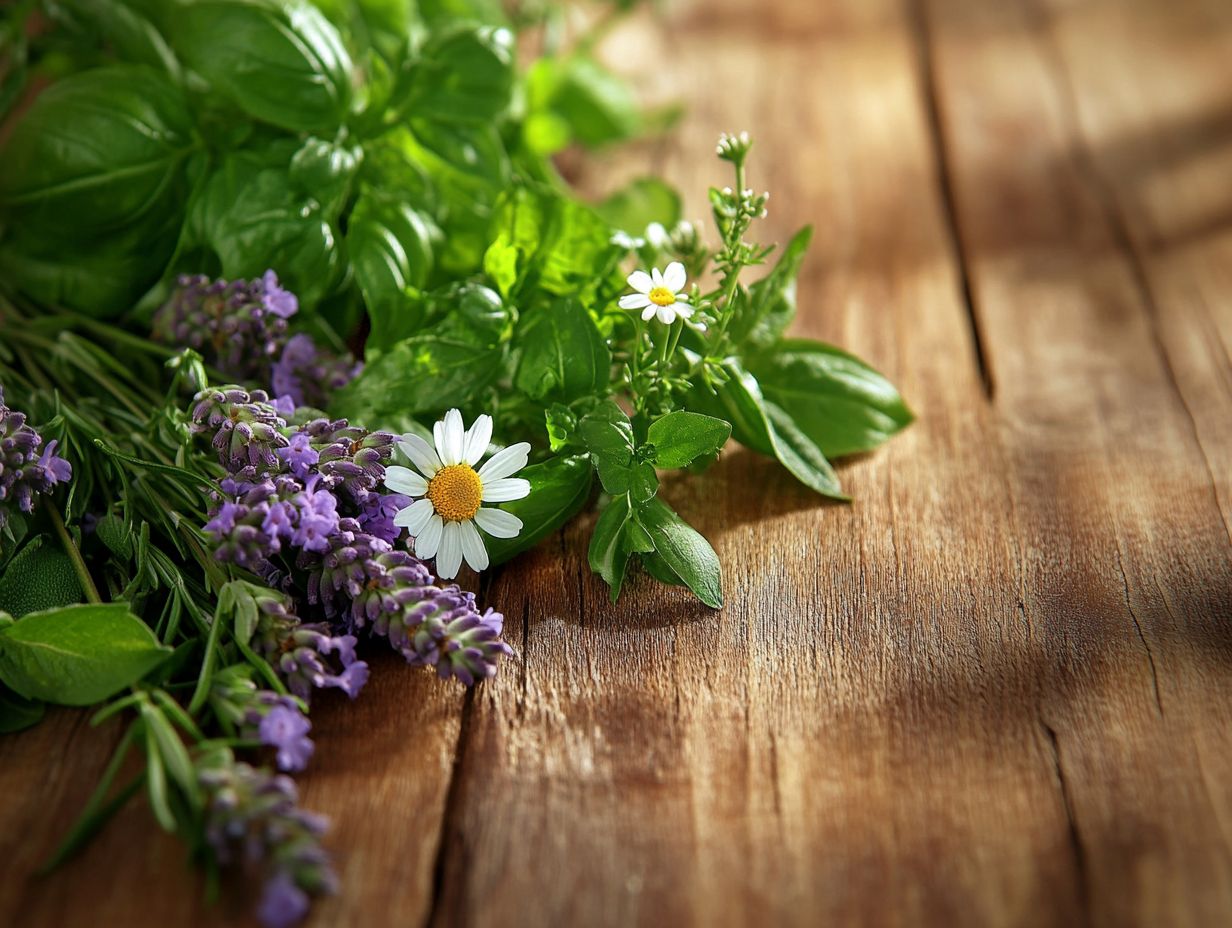
Rhodiola Rosea is an adaptogenic herb renowned for its exceptional ability to alleviate stress and enhance mood support, empowering you to thrive even in the most challenging circumstances.
This remarkable herb has been utilized for centuries, particularly within traditional Russian and Scandinavian medicine. It was cherished for its ability to boost physical endurance and combat fatigue.
The mechanisms behind its effects are truly intriguing. Rhodiola is thought to modulate your body s stress response by influencing key brain chemicals like serotonin and dopamine, which can lead to an uplifted mood and sharper mental clarity.
Recent scientific studies are starting to back up these claims, demonstrating that daily supplementation can significantly reduce cortisol levels the hormone most commonly associated with stress. This extraordinary herb not only contributes to your emotional well-being but also enhances cognitive function, positioning it as a valuable ally for anyone navigating the complexities of modern life.
5. Passionflower
Passionflower is a gentle yet powerful herb known for its calming effects, offering you anxiety relief and fostering a serene state of mind through its natural remedies.
This versatile plant has been a staple in traditional medicine for centuries, often appearing in various herbal teas or dietary supplements crafted to promote relaxation.
Steeping the flowers in hot water releases soothing compounds you can enjoy either warm or iced, making it a delightful addition to your wellness regimen.
You can even blend it with other calming herbs, like chamomile or lemon balm, creating a synergistic concoction that amplifies its beneficial properties.
Boost Your Mood Naturally with These Herbs!
Herbs like St. John’s Wort, Ashwagandha, and Lavender are essential allies in your quest for mood support, offering natural remedies that enhance your emotional well-being and provide much-needed stress relief in your daily life.
These remarkable herbs interact with your body s chemistry, primarily influencing brain chemicals that regulate mood. For example, St. John’s Wort is renowned for boosting serotonin levels, which can elevate your sense of happiness and diminish anxiety.
Ashwagandha, an adaptogen, gives your body the power to manage stress by regulating cortisol levels, fostering a calming effect.
Lavender, often celebrated in aromatherapy, sharpens your mental clarity and focus. Together, these herbs not only uplift your mood but also strengthen your emotional resilience, enabling you to navigate life s challenges with greater ease.
What Are the Potential Side Effects of These Herbs?
While herbs like St. John’s Wort and Ashwagandha present a wealth of benefits, it’s essential for you to be mindful of their potential side effects to ensure safe consumption.
- Mild gastrointestinal discomfort
- Interactions with prescription medications
These side effects underscore the importance of approaching these herbal remedies with caution. Consulting a healthcare provider can offer you valuable insights into your individual risk factors and help determine the appropriate dosages.
If you’re seeking mood support, consider integrating lifestyle changes, such as regular exercise and mindfulness practices, alongside these herbal treatments.
By prioritizing a comprehensive approach, you can effectively mitigate risks while enjoying the potential rewards these natural options have to offer.
Incorporating Herbs into Your Daily Life
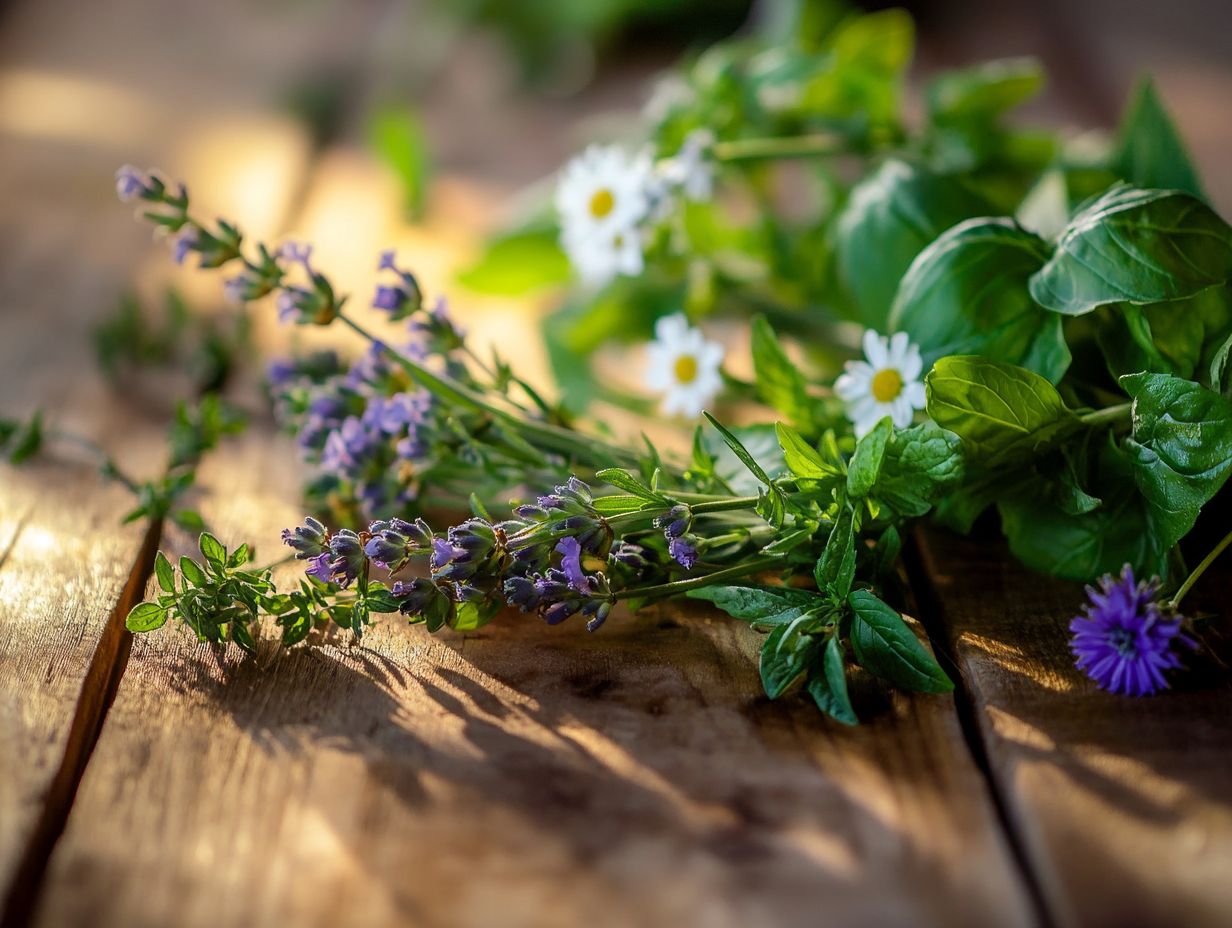
Incorporating herbs like Chamomile, Holy Basil, and Ashwagandha can boost your mood and relieve stress. These herbs can be easily integrated into your daily routine.
Steep Chamomile in hot water for a soothing tea, perfect for evening relaxation. Add Holy Basil to stir-fries or soups for flavor and tranquility.
Ashwagandha is available in various supplements, making it simple to include in your morning wellness routine. Consistent use of these herbs fosters a serene mindset and promotes an overall sense of well-being, which is invaluable in today s fast-paced world.
Interactions with Medications
Be aware of potential interactions between herbs like St. John’s Wort and certain medications. These combinations can significantly affect your treatment outcomes.
This awareness is crucial when blending herbal remedies with prescription drugs. For instance, your antidepressants or oral contraceptives may become less effective when using these herbal supplements. It s essential to communicate openly with your healthcare professionals about any herbal treatments you re considering.
A doctor or pharmacist can provide personalized guidance, ensuring you safely integrate these remedies into your treatment plan. You may need to monitor for side effects and adjust dosages, emphasizing the importance of professional support.
Recommended Dosages for Herbs
Understanding the right dosages for Ashwagandha, Chamomile, and St. John’s Wort is crucial. This helps maximize their mood-boosting benefits and reduces any risks.
Tailoring these dosages is vital based on factors like age, weight, health conditions, and any existing medications. If you’re new to herbal supplementation, start with a lower dose to gauge your body’s response.
Generally, Ashwagandha is suggested at a dose of 300 to 600 mg daily. Chamomile can be enjoyed in tea form or as concentrated extracts, usually around 400 mg. St. John’s Wort typically falls within 300 to 900 mg.
Consulting a healthcare professional can provide personalized recommendations, ensuring your approach is safe and effective.
Timeframe for Results
The timeline for seeing results from herbs like Lavender, Holy Basil, and Turmeric can vary based on individual factors such as body chemistry and the severity of mood-related issues.
You might typically notice effects within one to four weeks of consistent use, though this depends on dosage and method of consumption. Your diet, lifestyle, and any concurrent medications also significantly influence how quickly you experience improvements.
To see results, commit to a consistent routine. Without regular use, you may not experience the full benefits of these natural solutions.
Frequently Asked Questions
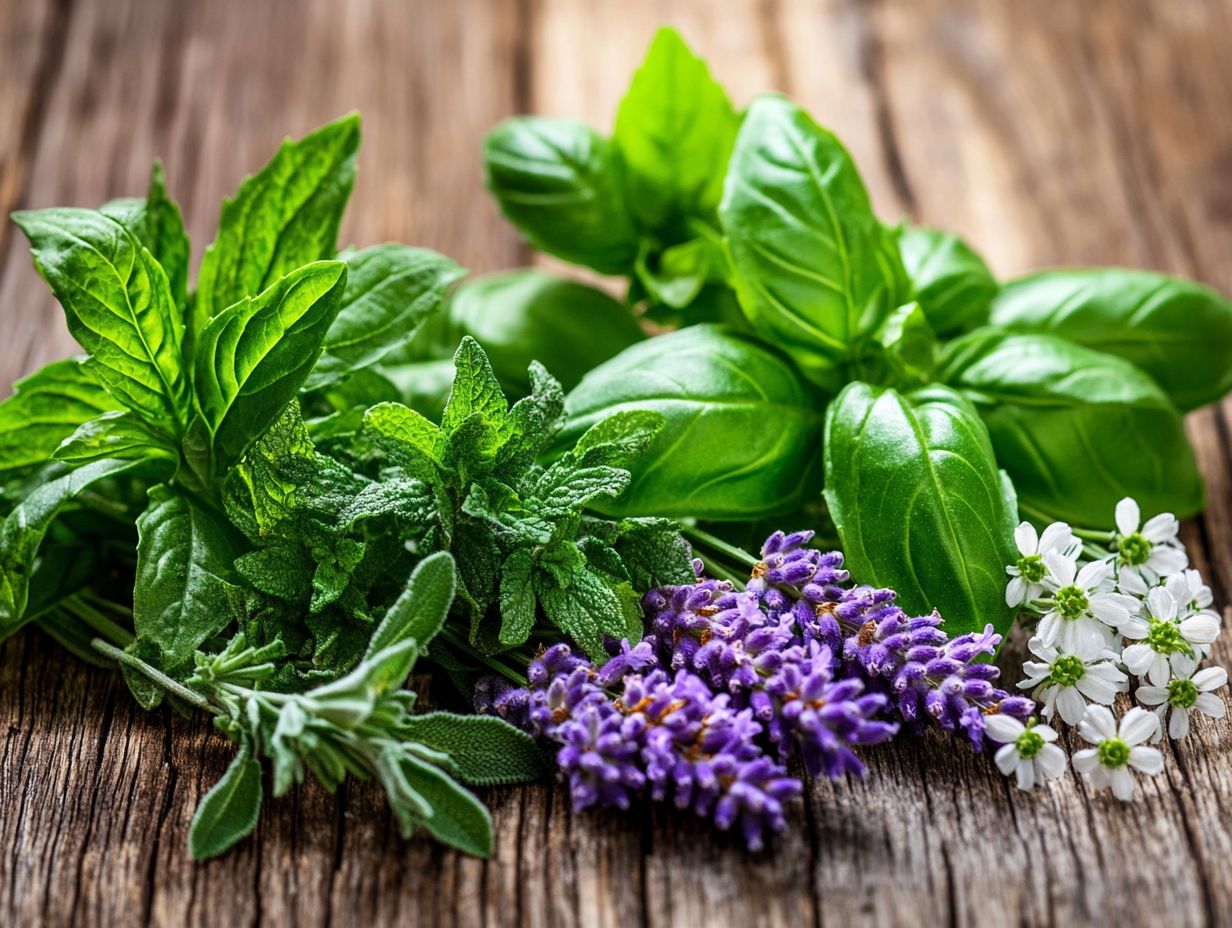
What are the 5 best herbs for mood boosting?
The top 5 herbs to boost your mood are St. John’s Wort, Ashwagandha, Rhodiola, Lemon Balm, and Passionflower.
How do these herbs help improve mood?
These herbs contain compounds that positively affect mood-related chemicals in the brain, such as serotonin and dopamine, while also influencing stress hormones like cortisol. For more insights, check out 5 common herbs and their benefits.
Are there any side effects to using these herbs?
These herbs are generally safe for most people. However, they can interact with some medications, leading to side effects like digestive upset, headaches, or dizziness. Always check with a healthcare professional before starting any new herb products.
Can these herbs be used with prescription medications?
It’s crucial to speak with a healthcare professional before mixing these herbs with prescription drugs. This helps avoid any interactions that could affect your health.
How can these herbs fit into your daily routine?
Incorporate these herbs easily by taking them as recommended by a healthcare professional. You can also brew them into teas or add them to your meals for a delightful twist!
What else can boost your mood besides these herbs?
A healthy diet, regular exercise, and enough sleep are essential for a good mood. Don t forget relaxation techniques like meditation and yoga. If you’re facing deeper issues, consult a mental health professional for support.

